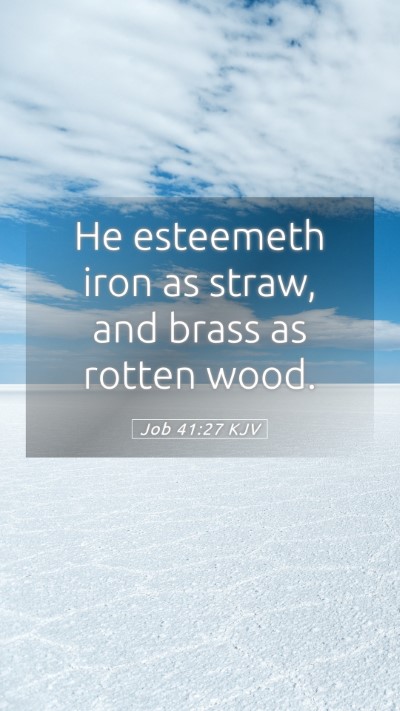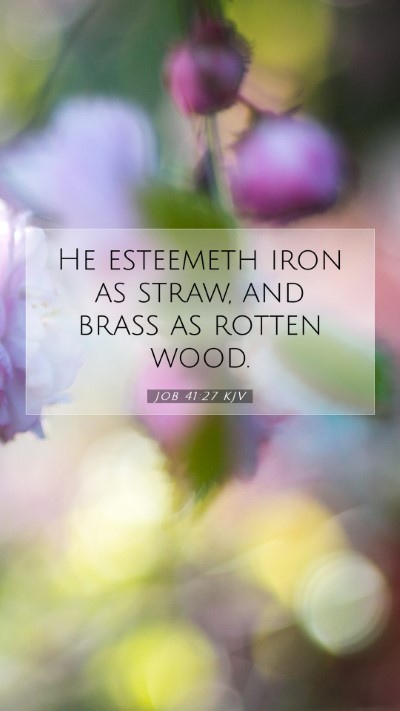Bible Verse Commentary on Job 41:27
Job 41:27 states: "He regards iron as straw, and bronze as rotten wood." This verse provides profound insight into the power and uncontested strength of the Leviathan, a creature described in the passage that symbolizes chaos and formidable force.
Context and Overview
The verse is part of God's discourse to Job, wherein He demonstrates His authority over creation and emphasizes God's omnipotence. The Leviathan, often interpreted as a fearsome sea creature or a metaphor for chaos, is portrayed in such a way that highlights its might and indifference to human tools and weaponry.
Insights from Commentaries
-
Matthew Henry:
Henry explains that the comparison of iron to straw illustrates the insignificance of human strength against God's creation. The imagery points toward the futility of trying to conquer or control what God has made to be so powerful. In the grand scheme of things, creatures like Leviathan operate under divine sovereignty.
-
Albert Barnes:
Barnes focuses on the metaphorical implications: the phrase indicates that for Leviathan, iron and bronze (representative of strength and defense) are utterly useless. This suggests a broader theological point—humans are frail and limited, unable to withstand the raw power embodied in God's creation.
-
Adam Clarke:
Clarke expands on this by discussing the historical interpretation of Leviathan, emphasizing its representation of evil forces or chaos. This verse, therefore, suggests that even the mightiest human measures are inadequate when faced with overwhelming challenges that reflect spiritual or moral dilemmas.
Theological Themes
-
The Sovereignty of God:
The portrayal of Leviathan underscores God's control over all creation, including those elements that humans find intimidating or beyond comprehension.
-
Human Limitations:
The commentary reflects that recognizing our limitations in the face of divine power can lead to a better understanding of humility and reliance on God.
-
Chaos and Disorder:
Leviathan symbolizes primordial chaos, reminding believers that God is even sovereign over chaos and forces that threaten order.
Cross References
- Psalms 74:14: Referring to the defeat of Leviathan as a symbol of God's power over chaotic forces.
- Isaiah 27:1: Mentions the slaying of Leviathan as a significant event highlighting divine judgment.
- Revelation 13:1: Uses similar imagery connected to chaos and the beast in prophetic context.
Application and Reflection
This verse invites believers to conduct an in-depth Bible verse analysis to explore how they might apply the understanding of God's sovereignty in their own lives. The recognition of our limitations can become a source of strength as we surrender our will to divine authority.
Conclusion
Job 41:27 illustrates the might of creation and our human vulnerability, prompting a deeper Bible verse understanding of God's position as the ultimate authority. This verse enriches our Bible study insights, offering profound lessons applicable to modern life.


